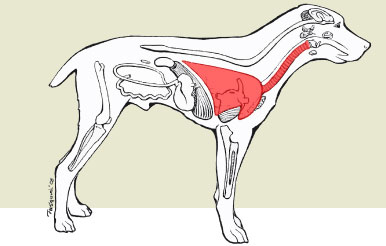Respiratory: Kennel Cough
Respiratory Quicklinks
Kennel Cough is another name for “Infectious Tracheobronchitis”. This disease is characterized by inflammation of the upper parts of the respiratory system (primarily the bronchi, trachea and larynx, but can spread to the lungs and lower airways). It is a self limiting, mild condition, but in chronic cases the disease may progress to a fatal bronchopneumonia (Inflammation involving the lungs and bronchus) in young dogs to severe bronchitis (Inflammation of Bronchi) in adult dogs or aged dogs. The rate of illness is usually higher for the dogs housed in close premises, such as hospitals or kennels.

Kennel Cough Dogs
Symptoms Occur in the Upper Respiratory System, but can spread to the
lower respiratory system
Source: Cornell University College of Veterinary Medicine
Symptoms of kennel cough dogs includes frequent cough which is followed by retching of a white foam mucus. The cough might be a honking type sound. Dogs do not lose their appetite or appear lethargic.
Most cases are referred to as being a case of uncomplicated kennel cough. This type will go away on its own in 2 weeks. Complicated kennel cough dogs usually have some other medical problem such as pneumonia. Complicated canine kennel cough has additional kennel cough symptoms such as weight loss, lack of energy, reduced appetite, and dyspnea (shortage of breath).
The treatment plan should proceed as per the stage
of pathogenesis (development of disease) and the mode of disease, e.g.
housing is a factor.
Treatment Plan
Treatment of canine kennel cough involves
different procedures, requirements and precautions.
Management:
Management of the affected dog includes good
nutrition, hygienic measures, nursing care and eradication of
predisposing factors such as reducing the environmental contamination
helps in rapid recovery. It is highly recommended that the affected dog
is not hospitalized since the disease is highly contagious.
Dog Kennel Cough Treatment:
Symptomatic treatment involves administration of cough suppressants which contains codeine derivatives. These may be hydrocodone or butrophanol. These cough suppressants should only be used when needed in case of persistent non productive cough.
Honey, sugar and peppermint are some home remedies
and are very effective in controlling persistent cough, as these
preparations soothe the respiratory tract. Other drugs such as
dexamethasome (cortico steroids) are helpful in eradicating symptoms,
but are contraindicated, (dogs may have a reaction, fatal side effects
as respiratory collapse) if used along with antibiotics in severely ill
& coughing dogs.
Use of Antibiotics:
Antibiotics are usually not required for just treating mild infectious tracheo bronchitis (Kennel Cough), but in chronic conditions, antibiotics are a necessary part of treatment. In this context those antibiotics are usually preferred which are strong enough to reach in tracheo bronchial mucosa (surfaces covered with fluid & cells, usually “squamous epithelial tissues”).
Tetracyclines, Cephalosporins, Quinolones
& Chloramphenciol are effective in respiratory tract
infections. Sometimes bronchoscopy or examination of bronchus is
required to select the right antibiotic for the dog undergoing
treatment, while in some cases laboratory examinations, such as
sensitivity test, & culturing of samples collected from
respiratory tract is required to select antibiotics.
Oral and intramuscular injections of antibiotics are usually considered
less effective in respiratory tract infection, thus vets usually
recommend aerosolization, where antibiotics are diluted in distal
water, and then administered as an aerosol, for usually 3 consecutive
days, along with some bronchodilators (Drugs used to dilate or relax
the bronchial tract). Aerosolization is more effective then any other
administration technique for antibiotics.
Prevention:
Dogs should be vaccinated against Distemper, Para Influenza, and CAV – 2 to prevent possible infectious tracheo bronchitis. The initial vaccination should be at age of 6 – 8 weeks against these diseases, repeated twice at interval of 3 – 4 weeks until the dog is 14 – 16 weeks old. Annual booster dose is thereafter required.
Other preventive measures include hygienic environment, contamination free nutrition & low contact with other dogs in area.
As an added level of support against kennel cough
dogs, there is a homeopathic remedy available manufactured to help
support dogs with or who are frequently exposed to Kennel Cough. The
product, PetAlive
KC-Defense Formula, could help dogs that respond, with the
natural treatment of kennel cough and other canine respiratory
infections. It contains herbs such as Plantago
lanceolata (soothes throat and upper respiratory tract)
and others that have clinical studies supporting its effectiveness.
Click on the link for further research.
Precautions:
Antibiotics if administered along with corticosteroids have adverse effects on severely ill, coughing dogs. Corticosteroids are usually advised in mild kennel cough as symptomatic approach of treatment.
Some dogs are sensitive to different groups of
antibiotics, so a sensitivity test is usually recommended before
administration.
|
|